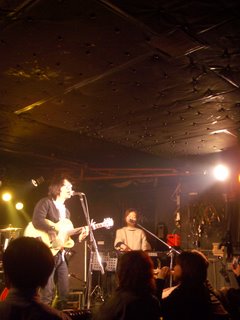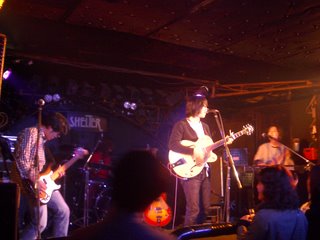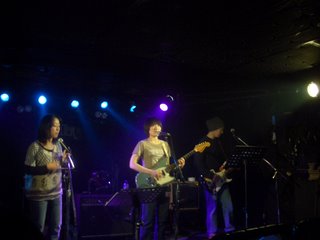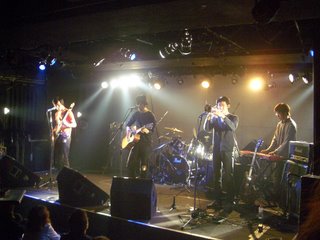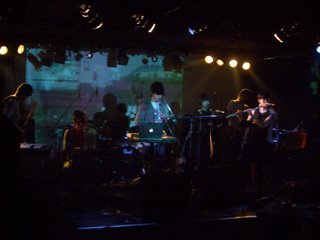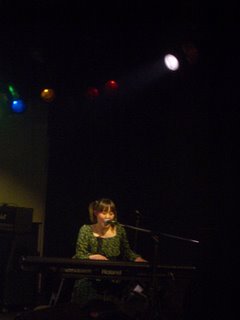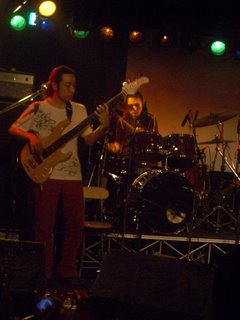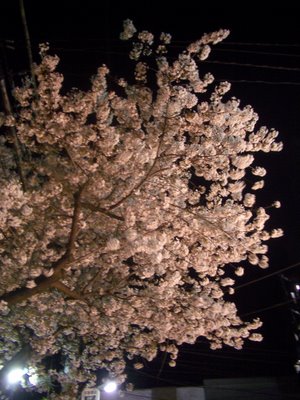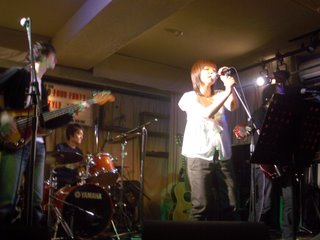 I wasn’t well-versed in the complex ritual of claiming a reserved ticket and getting into the club at Shimokitazawa’s 440, so even though I got there right at the opening time at 7PM last night to see Swinging Popsicle, I was very much at the end of the line.
I wasn’t well-versed in the complex ritual of claiming a reserved ticket and getting into the club at Shimokitazawa’s 440, so even though I got there right at the opening time at 7PM last night to see Swinging Popsicle, I was very much at the end of the line.Apparently, if you’ve reserved a ticket, you’re supposed to go to the club at 6 in the evening, to be issued a numbered ticket. Then, at 7PM, the staff lets people in according to the alphabetical letters and the numbers on those tickets: “All A’s and all B’s up to 20 can now enter”, etc. It was very meticulously done in a distinctly Japanese way. If you hadn’t gotten a number at 6 though, your place was at the tail end of the queue. And, in the looking glass world that Japan sometimes is, if you were on the guest list, you were allowed into the club at the very end, even after all the clueless ticket reservers like me who hadn’t showed up at 6 to take a number (the reason being that paid customers should get in before people on the guest list, who are seeing the show for free—whereas, in the U.S. and elsewhere, wouldn’t people on the guest list go in first?). So, my friends Steve Laity and Yaeri, who were both on the list, had to wait until the last minute to enter the club.
This all matters because the 440 is a café club, which means you watch events seated at a table and the earlier you get in, the better your seat is. If you get in too late, on the other hand, you may end up watching the show standing uncomfortably between various café furniture, feeling on your back the unhappy stare of a sitting customer whose view you are blocking… Fortunately, Steve and I found open space on steps right next to the stage, and we ended up with an up-close view of the Swinging Popsicle performance.
I’ve written several times before about Swinging Popsicle gigs, so I’ll keep this simple: the trio is always a joy to watch, three veteran musicians who pump out sweet and spirited pop songs with expertise, and last night’s show was no exception. I’ve described singer Mineko Fujishima as a soul diva in a petite Japanese woman’s body, and that was true. She said later she was nervous during the gig because it was the band’s first in a few months, but it didn’t show at all. You can listen to song samples of theirs here.
Swinging Popsicle is headed to San Jose, California in late-May to play at an anime convention called Fanime, along with the Japanese bands Guitar Vader, Miami, Goofy Style, Poplar and Up Hold. If you are in the Bay Area and are interested in the music (or if you are somewhere else and wouldn’t mind traveling to listen to some Japanese music), I highly recommend going. I, for one, am traveling from Tokyo to attend the event—maybe if you are there, I’ll see you.
The band also said they will be performing with advantage Lucy on July 16, once again at the 440.
Yes!
Yes!!
Advantage Lucy and Swinging Popsicle are two of my favorite Japanese groups.
Next time, though, I’ll know to get my number at 6PM.
